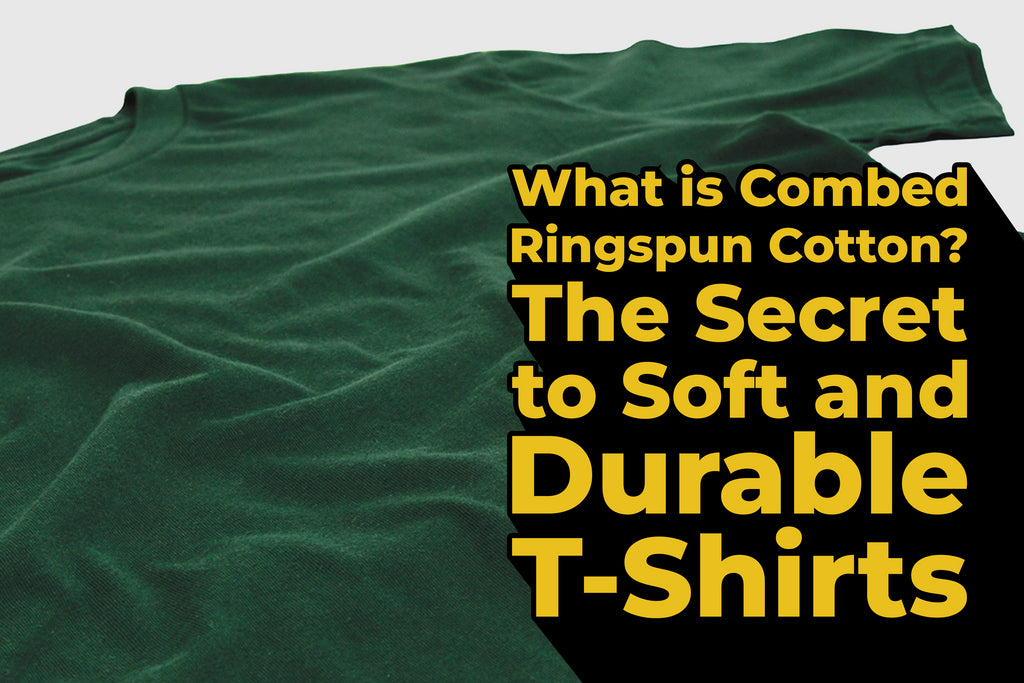What is Combed Ringspun Cotton? The Secret to Soft & Durable T-Shirts
Posted by ARTEMIO NERVEZ JR

Have you ever wondered why some t-shirts feel incredibly soft and comfortable while others are rough and scratchy? The secret lies in the type of cotton used to make them. One such variety that stands out for its superior quality is combed ring-spun cotton.
Combed ring spun cotton is a premium type of cotton that undergoes a special manufacturing process. This process involves combing out impurities and short fibers and then spinning the longer, stronger fibers into a fine yarn. The result? A fabric that's not only softer to the touch but also more durable than regular cotton.
Before we delve deeper into the world of combed ring-spun cotton, let's first understand what exactly cotton is. Knowing about this versatile plant fiber will help us appreciate why certain types like combed ring spun are considered top-tier in terms of comfort and durability.
What is Cotton?
Cotton, a soft and fluffy staple fiber that grows in a boll around the seeds of the cotton plant, has been cultivated for thousands of years. This natural product is known for its breathability and durability, making it an ideal fabric for clothing. The history of cotton dates back to ancient civilizations across the globe, from India to Egypt to Mexico.
Different types of cotton are used in various applications based on their unique properties. For instance, Egyptian cotton is renowned for its long fibers and high thread count, making it perfect for luxury bed linens. Pima cotton, also known as Supima when grown in the US, shares similar qualities with Egyptian cotton but is primarily used in high-end towels and apparel.
On the other hand, Upland cotton accounts for nearly 90% of all cotton produced worldwide due to its versatility and affordability. It's commonly found in everyday items like t-shirts and denim jeans. Organic cotton is another type gaining popularity because it's grown without harmful pesticides or synthetic fertilizers.
Each type of cotton brings something different to the table whether it's superior softness, exceptional durability, or environmental sustainability. Therefore understanding these differences can help you make informed decisions when purchasing products made from this versatile material.
As we continue our exploration into the world of textiles, next up on our list is ring-spun cotton a special type that undergoes additional processing steps to enhance its softness and strength.
What is Ring-spun Cotton?

Ring-spun cotton, as the name suggests, is a type of cotton that undergoes a unique spinning process. This process involves twisting and thinning the cotton strands to create a very fine, strong, soft yarn. The result? A fabric that's not only incredibly comfortable but also highly durable.
How is Ring-spun Cotton Made?
The production of ring-spun cotton involves several steps. First off, raw cotton fibers are cleaned to remove any impurities. These cleaned fibers are then straightened and twisted together to form a soft yet sturdy yarn. This twisting process enhances the strength of the yarn while maintaining its softness.
This spun yarn is then wound onto large spools or bobbins in preparation for weaving or knitting into fabric. The end product? A high-quality fabric with an ultra-soft feel and superior durability compared to regular cotton fabrics.
One key characteristic that sets ring-spun cotton apart from other types of cotton is its smoothness. Due to the spinning process, ring-spun cotton has fewer loose threads and imperfections on its surface than regular cotton does. This results in a smoother finish that's not just pleasing to the touch but also more comfortable against your skin.
Why Choose Ring-Spun Cotton?
There are many reasons why you might choose ring-spun over regular cotton when shopping for clothing items like t-shirts or hoodies at V.S Tees. For starters, it's softer than traditional coarser varieties of cotton because it's made from long-staple fibers that have been combed through for uniformity before being spun into yarn.
Not only does this make ring-spun garments feel luxurious against your skin, but they're also less likely to irritate sensitive skin types due to their smooth finish.
But comfort isn't all there is let's talk about durability too! Thanks to the tight weave used in making ring-spun fabric, these garments tend not only to be stronger but also more long-lasting than their regular cotton counterparts. This means that your favorite ring-spun t-shirt or hoodie from V.S. Tees will keep its shape and color for longer, even after numerous washes.
Comparison between Ring-spun and Regular Cotton
When compared to regular cotton, the difference in quality is clear. Regular cotton fibers are shorter and have a rougher texture due to the lack of a spinning process. On the other hand, ring-spun cotton has a smoother surface because of the extra steps taken during production.
This results in a fabric that's not just softer and more comfortable but also more durable. So whether you're looking for a cozy hoodie to lounge around in or a stylish t-shirt to wear out, choosing garments made from ring-spun cotton at V.S Tees ensures you get both comfort and durability.
As we move on from understanding what ring-spun cotton is all about, let's delve into another important aspect of textile production 'Combing'. This process plays an equally crucial role in determining the quality of your clothing items.
What Does 'Combing' Mean in Textile Production?

In the world of textiles, combing is a crucial process that significantly impacts the quality of the final product. This process involves aligning all the fibers in a parallel manner and removing any short or impure fibers. The result? A smoother, stronger, and more uniform yarn that's perfect for creating high-quality garments.
The combing process begins with raw cotton or wool. These materials are first carded a step which detangles and cleans the fibers but leaves them in a somewhat disordered state. Combing takes this a step further by aligning these fibers perfectly parallel to each other. This meticulous alignment not only gives the yarn its smooth texture but also enhances its strength and durability.
The Combing Process Explained
Let's delve deeper into how exactly this combing process works. It starts with feeding the carded material through a series of combs or pins arranged closely together. As these combs move through the material, they catch hold of longer fibers while shorter ones slip out, effectively separating them.
But it doesn't stop there! The combs also remove any remaining impurities like dirt or plant matter that might have been missed during carding. So what you're left with is pure, long-staple fiber that's ready to be spun into premium quality yarn.
The benefits of this rigorous combing process are manifold. For one, it results in an extremely smooth yarn free from any knots or lumps ideal for crafting soft and comfortable clothing items like t-shirts and hoodies at V.S Tees.
Difference Between Combed and Carded Cotton
You may wonder why go through all this trouble when we already have carded cotton? Well, here lies another key aspect where combed cotton stands out from its carded counterpart quality!
While both types start off similarly with raw cotton being cleaned and detangled, it's the additional step of combing that sets them apart. Combed cotton goes through an extra level of refinement which results in a higher quality yarn.
This means combed cotton is not only softer and smoother but also stronger than carded cotton. It's less likely to fray or tear, making it perfect for items that need to withstand regular wear and washing like your favorite t-shirt or hoodie!
But don't get us wrong carded cotton has its place too! It's generally cheaper and works well for heavier, more rugged items where softness isn't the top priority. So depending on what you're after be it ultimate comfort with combed cotton or cost-effectiveness with carded both have their unique advantages.
As we wrap up our discussion on combining in textile production, let's shift gears a bit. We've talked about how combing leads to high-quality yarns, but there's another term you might come across when shopping for your tees at V.S. Tees ring-spun. What does this mean? And how does it relate to combed cotton? Stay tuned as we delve into the world of "Combed Ring-spun Cotton" next.
Understanding Combed Ring-spun Cotton

Combed ring-spun cotton is a premium quality fabric that's loved for its softness and durability. It's the result of a meticulous production process that combines two techniques: combing and ring spinning. This combination results in a fabric with an incredibly smooth texture, perfect for creating comfortable yet durable clothing items like t-shirts.
The process begins with raw cotton fibers, which are cleaned to remove any impurities. The fibers are then combed, a step that aligns the fibers and removes any short ones. This results in longer, straighter fibers that produce a smoother yarn when spun.
How is Combed Ring-Spun Cotton Produced?
In the production of combed ring-spun cotton, combing is followed by ring spinning. Ring spinning is a method used to create fine, strong yarns from combed cotton fibers. The resulting yarn has fewer loose ends and knots compared to other types of spun yarns.
The unique characteristics of combed ring-spun cotton come from this combination of processes. The combing step ensures the removal of shorter fibers and impurities while aligning the remaining long fibers parallelly. This alignment makes it easier for them to be tightly twisted during ring spinning, resulting in stronger yarns.
Advantages of Using Combed Ring-spun Cotton
Compared to regular cotton fabrics, combed ring-spun cotton offers several advantages due to its unique production process. Its superior strength comes from the tight twist given during ring spinning which also contributes to its durability making it ideal for everyday wear.
Another advantage lies in its softness; because only long fiber lengths are used (thanks to combing), there’s less chance for protruding ends leading to an overall smoother feel against your skin – perfect if you value comfort as much as style!
Its popularity extends beyond just being favored by clothing manufacturers; consumers too appreciate these qualities especially when they're looking for comfortable yet durable clothing items like t-shirts.
Its Popularity in Certain Industries/Products (e.g., T-Shirts)
The use of combed ring-spun cotton is widespread in the textile industry, particularly in the production of t-shirts. The fabric's softness and durability make it an ideal choice for this type of casual wear. It provides a smooth surface that's perfect for custom printing, allowing designs to be displayed without compromising on comfort or quality.
Its popularity isn't limited to just t-shirts though; you'll also find combed ring-spun cotton being used in other apparel such as pullovers, hoodies, and joggers. So next time you're shopping for casual wear, remember to check the label – if it says 'combed ring-spun cotton', you can expect a garment that's not only stylish but also comfortable and long-lasting!
As we move forward with our discussion on different types of cotton fabrics, let’s shift our focus toward comparing combed ring-spun cotton with other types of cotton.
Comparing Combed Ring-spun with Other Types Of Cotton

Combed ring-spun cotton is a type of cotton that undergoes an additional refining process compared to other types. This process involves combing the cotton fibers to remove any impurities or short fibers, resulting in a smoother and more durable fabric. The term "ring-spun" refers to the spinning technique used, which twists and thins the cotton strands to make a very fine, strong, soft yarn.
In contrast, regular or open-end cotton does not go through this extra step of refinement. As such, it tends to be rougher and less durable than combed ring-spun cotton. It's often used for mass-produced items due to its lower cost but lacks the softness and longevity of its combed counterpart.
Another type of cotton you might come across is carded open-end. While it also goes through a combing process like combed ring-spun, it doesn't have the same level of refinement. Carded open results in a coarser texture compared with combed ring-spun but is still softer than regular cotton.
As you can see from this table, while combed ring-spun may come at a slightly higher cost than other types of cotton, its superior softness and durability make it worth the investment for many customers seeking quality apparel.
The choice between these different types ultimately depends on your individual needs and preferences. If comfort and longevity are high on your list of priorities when shopping for casual wear, then you'll likely find that garments made from combed ring-spun cotton meet your needs perfectly. On the other hand, if cost is a major factor for you, then regular or carded open-end cotton might be more suitable.
Now that we've compared different types of cotton, let's move on to understanding how combed ring-spun cotton can be practically applied in our everyday lives.
Practical Applications Of Combed Ring-spun Cotton In Everyday Life
Combed ring-spun cotton is a premium fabric that has found its way into various aspects of our everyday life. Its unique properties, such as softness, durability, and breathability, make it an ideal choice for different applications. From the clothes we wear to the linens we use at home, combed ring-spun cotton plays a significant role in enhancing our comfort and lifestyle.
Clothing Industry
The clothing industry is one area where the use of combed ring-spun cotton is quite prevalent. High-quality t-shirts are often made from this material due to its superior softness and comfort. The process of combing removes short fibers and impurities from the cotton, resulting in longer strands that are tightly twisted together to create a stronger, smoother, and finer yarn. This results in a fabric that not only feels luxurious against the skin but also holds up well with regular wear and washing.
Undergarments made from combed ring-spun cotton are another popular item in the clothing industry. The softness of this material provides ultimate comfort while its breathability helps keep you cool throughout the day. Moreover, because it's so durable, these undergarments can withstand frequent washes without losing their shape or quality.
The popularity of combed ring-spun cotton in the clothing industry can be attributed to these factors: unmatched comfort due to its soft texture; durability which ensures longevity even with regular use; breathability which makes it suitable for all types of weather conditions; and versatility as it can be used for various types of garments including t-shirts, undergarments among others.
Home Textiles
Moving on from clothes to home textiles bed linens made from combed ring-spun cotton offer unparalleled comfort when you're winding down after a long day. These sheets feel incredibly smooth against your skin making your bedtime experience more enjoyable. Not just bed linens, but even towels made from this material are highly absorbent and soft, enhancing your bathing experience.
The benefits of using combed ring-spun cotton products at home go beyond just comfort. This fabric is known for its durability which means these products will last you a long time without losing their quality or appearance. They're also easy to care for as they can be machine washed without worrying about them shrinking or fading.
In conclusion, the practical applications of combed ring-spun cotton in everyday life extend from the clothing industry to home textiles. Its superior qualities such as softness, durability, breathability, and versatility make it an ideal choice for various uses. Now that we've understood how beneficial this material is in our daily lives, let's move on to understanding how to care for products made from combed ring-spun cotton.
How To Care For Combed Ring-spun Cotton Products

Combed ring-spun cotton products are known for their softness and durability. However, to maintain these qualities, it's essential to care for them properly. The first step in caring for your combed ring-spun cotton products is washing them correctly. It's recommended that you wash these items in cold water on a gentle cycle to prevent the fabric from shrinking or losing its shape.
When washing your combed ring-spun cotton items, avoid using harsh detergents or bleach as they can damage the fibers of the fabric and cause fading. Instead, opt for a mild detergent that is free from harmful chemicals. Also, consider turning your garments inside out before washing to protect the printed designs or colors from direct contact with other clothes or the washing machine drum.
Tips for Washing and Maintaining Quality of Combed Ring-spun Cotton Products
To keep your combed ring-spun cotton clothing looking new longer, there are several tips you should follow. First off, always air dry your garments instead of using a dryer. Heat can break down the fibers of the fabric over time causing it to lose its softness and durability. If you must use a dryer, make sure it's set on low heat.
Another tip is ironing your garments at low temperatures if needed but avoid ironing directly onto any printed designs as this could potentially ruin them. When storing your combed ring-spun cotton clothing, fold them neatly instead of hanging them up to prevent stretching out the fabric.
Common Mistakes To Avoid When Caring For These Products
There are common mistakes many people make when caring for their combed ring-spun cotton products which can lead to premature wear and tear. One such mistake is over-washing these items; while cleanliness is important, excessive washing can weaken the fibers leading to pilling or thinning of the material.
Another common mistake is not reading care labels. These labels provide specific instructions on how to best care for your garment, including washing and drying guidelines. Ignoring these instructions can result in damage to the fabric or fading of colors.
Finally, avoid using fabric softeners when washing your combed ring-spun cotton items. While it may seem like a good idea to keep your clothes soft, fabric softeners can build up on the fibers over time and reduce their absorbency and breathability.
In conclusion, caring for your combed ring-spun cotton products doesn't have to be complicated. By following these simple tips and avoiding common mistakes, you can ensure that your garments remain as comfortable and durable as they were when you first bought them.
Conclusion
At V.S. Tees, we understand the importance of expressing your unique style and creativity through your attire. That's why we offer a wide range of high-quality blanks in various colors, styles, and sizes that you can customize to reflect your personality. Our premium materials ensure comfort and durability, so you can rock your custom designs with confidence.
We invite you to browse our selection online or visit us at our Los Angeles location. Whether you're looking for a trendy hoodie or a classic t-shirt, we've got something for everyone. And don't forget about our custom printing services! Upload your design or work with our team to create something truly unique. Take advantage of our current promotion and make V.S. Tees your one-stop shop for stylish and comfortable casual wear today!
Key Takeaway: V.S. Tees offers a curated collection of high-quality blanks available in various colors, styles, and sizes made from premium materials ensuring comfort and durability along with custom printing services including screen printing, direct-to-garment printing, embroidery allowing customers to express their creativity through personalized prints.





